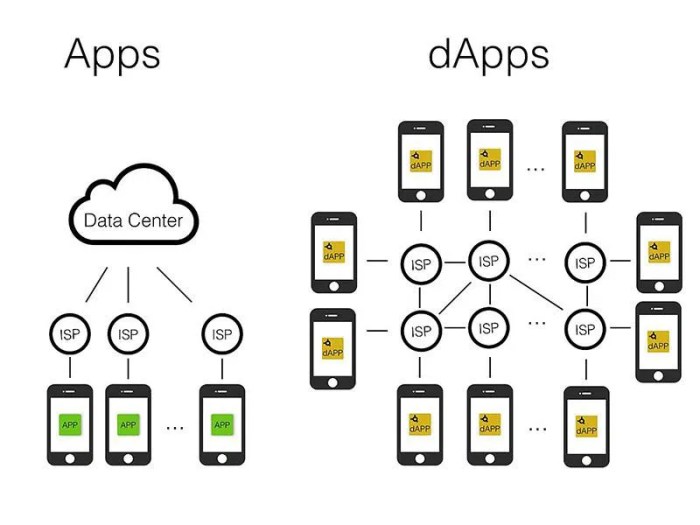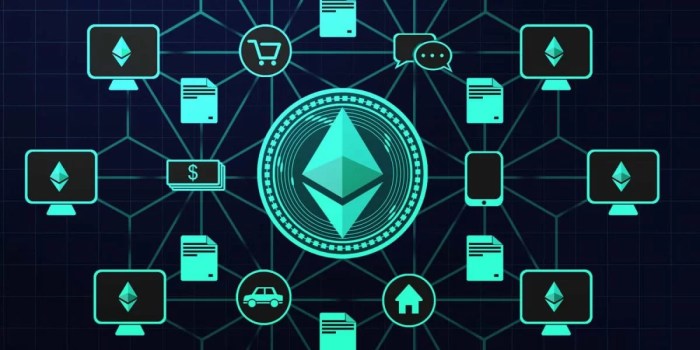Decentralized apps are taking the tech world by storm, offering a new way of interacting with digital platforms that challenges the status quo. From their unique structure to the benefits they bring, let’s dive into the world of decentralized apps.
As we explore the realm of decentralized apps, we uncover the key aspects that set them apart from traditional applications, paving the way for a more secure and transparent digital future.
Overview of Decentralized Apps
Decentralized apps, also known as dApps, are applications that run on a decentralized network of computers rather than a single centralized server. This means that no single entity has control over the entire network, making them more secure and resistant to censorship.
One of the main benefits of decentralized apps is their increased security and privacy. Since they are not controlled by a single entity, it is much harder for hackers to compromise the entire network. Additionally, dApps are more resistant to censorship, as no central authority can shut them down.
Some popular decentralized apps currently in use include:
Examples of Popular Decentralized Apps
- Uniswap: A decentralized exchange that allows users to trade cryptocurrencies without relying on a central authority.
- Brave Browser: A web browser that blocks ads and trackers, allowing for a more private browsing experience.
- Augur: A decentralized prediction market platform where users can bet on the outcome of events.
- OpenSea: A decentralized marketplace for buying and selling digital assets like NFTs (non-fungible tokens).
Blockchain Technology in Decentralized Apps

Blockchain technology plays a crucial role in powering decentralized apps by providing a secure and transparent way to manage data and transactions.
Smart contracts are utilized in decentralized applications to automate and enforce the terms of agreements between users. These self-executing contracts are stored on the blockchain and eliminate the need for intermediaries, reducing costs and increasing efficiency.
Impact of Blockchain on Security and Transparency
Blockchain technology enhances the security of decentralized apps by providing immutability and transparency. Each transaction is recorded on a distributed ledger, making it tamper-proof and resistant to fraud. This transparency instills trust among users as they can verify the integrity of the data themselves.
Overall, blockchain technology revolutionizes the way decentralized apps operate by ensuring secure and transparent transactions through the use of smart contracts and decentralized networks.
Development of Decentralized Apps
When it comes to developing decentralized apps, the process involves taking an idea from concept to deployment, ensuring that the application is secure, user-friendly, and functional. Developers need to consider various factors such as scalability, interoperability, and smart contract integration throughout the development cycle.
Key Programming Languages and Frameworks
- Ethereum: Solidity is the most commonly used programming language for developing decentralized apps on the Ethereum blockchain. Frameworks like Truffle and Embark provide tools for easier development and testing.
- Hyperledger Fabric: Developers often use Go Lang and JavaScript to build decentralized apps on the Hyperledger Fabric platform. Fabric SDKs and Composer offer frameworks to streamline development.
- EOS: C++ and WebAssembly are frequently used for building decentralized apps on the EOSIO platform. The EOSIO software provides a development kit for creating scalable applications.
Best Practices for Designing User-Friendly Apps
- Simple User Interface: Design the app with a clean and intuitive interface to enhance user experience and encourage adoption.
- Security Measures: Implement robust security protocols to protect user data and ensure the integrity of transactions on the decentralized network.
- Scalability: Consider scalability from the outset to accommodate a growing user base and increasing transaction volume without compromising performance.
- Community Engagement: Foster a strong community around the decentralized app to gather feedback, address user concerns, and drive continuous improvement.
Decentralized App Ecosystem

Decentralized applications, or dApps, have created a vibrant ecosystem that is reshaping the digital landscape. These apps operate on blockchain technology, offering increased security, transparency, and autonomy to users. Let’s delve into the decentralized app ecosystem and explore the platforms supporting their development.
Platforms Supporting Decentralized App Development
- Ethereum: Known as the pioneer of dApp development, Ethereum offers a robust platform for creating decentralized applications through smart contracts.
- EOS: EOS provides a scalable infrastructure for dApp development, with high transaction speeds and low fees, attracting developers looking for efficiency.
- Tron: Tron focuses on high throughput and low latency, making it an appealing choice for developers seeking to build decentralized apps with seamless user experiences.
Decentralized App Marketplaces, Decentralized apps
- OpenBazaar: A decentralized marketplace where users can buy and sell goods without intermediaries, promoting peer-to-peer transactions.
- dApp.com: A platform that showcases various decentralized applications across different categories, providing users with a comprehensive overview of the dApp landscape.
- State of the DApps: A curated list of decentralized applications, allowing users to discover and explore a wide range of dApps based on their interests and preferences.
Challenges and Opportunities
- Challenges: One of the key challenges in the decentralized app landscape is scalability, as the current blockchain infrastructure may struggle to handle a high volume of transactions. Additionally, user adoption and regulatory uncertainties pose hurdles to widespread dApp usage.
- Opportunities: Decentralized apps offer opportunities for innovation in various industries, including finance, healthcare, and supply chain management. With increased emphasis on data privacy and security, dApps have the potential to revolutionize how we interact with technology.
